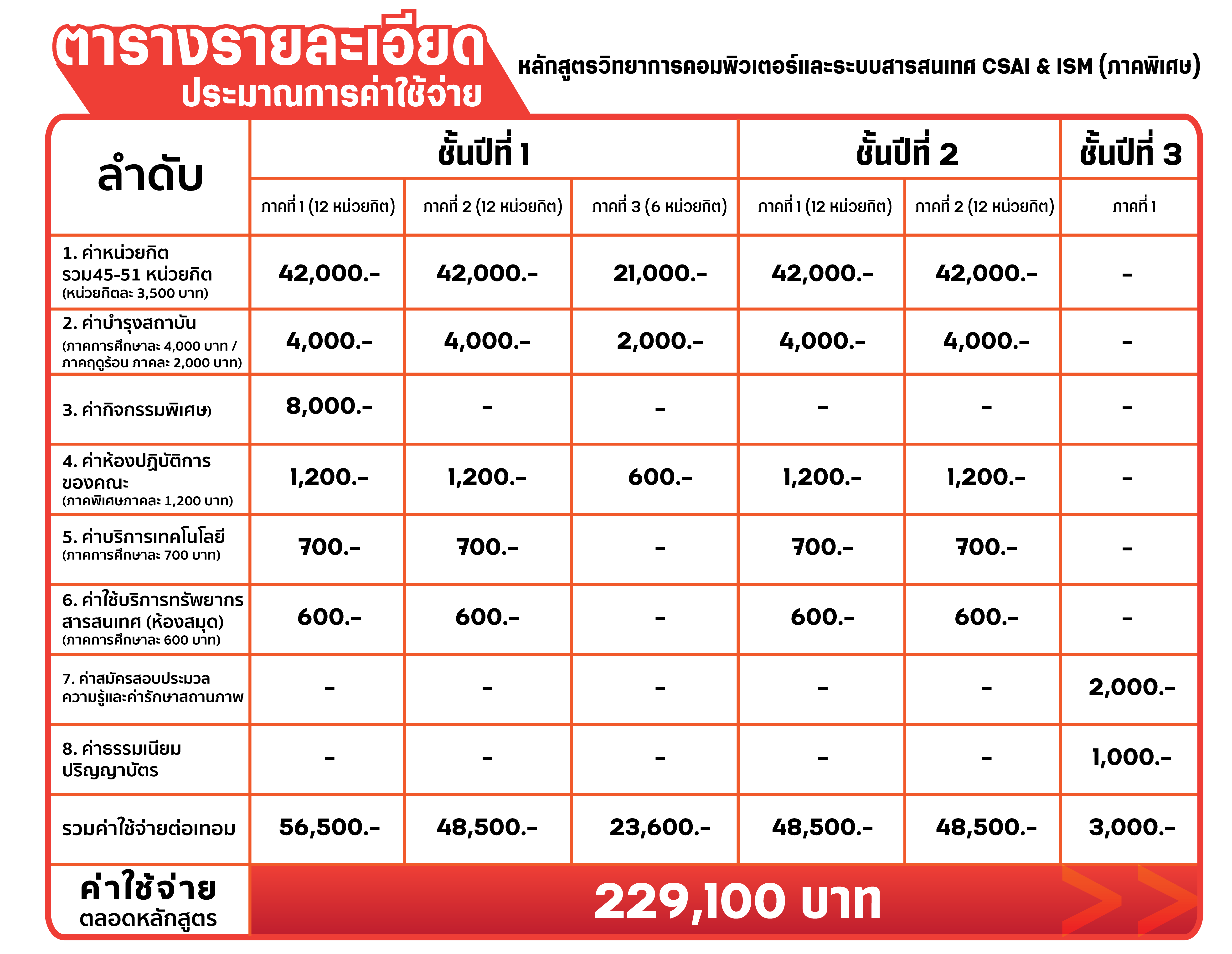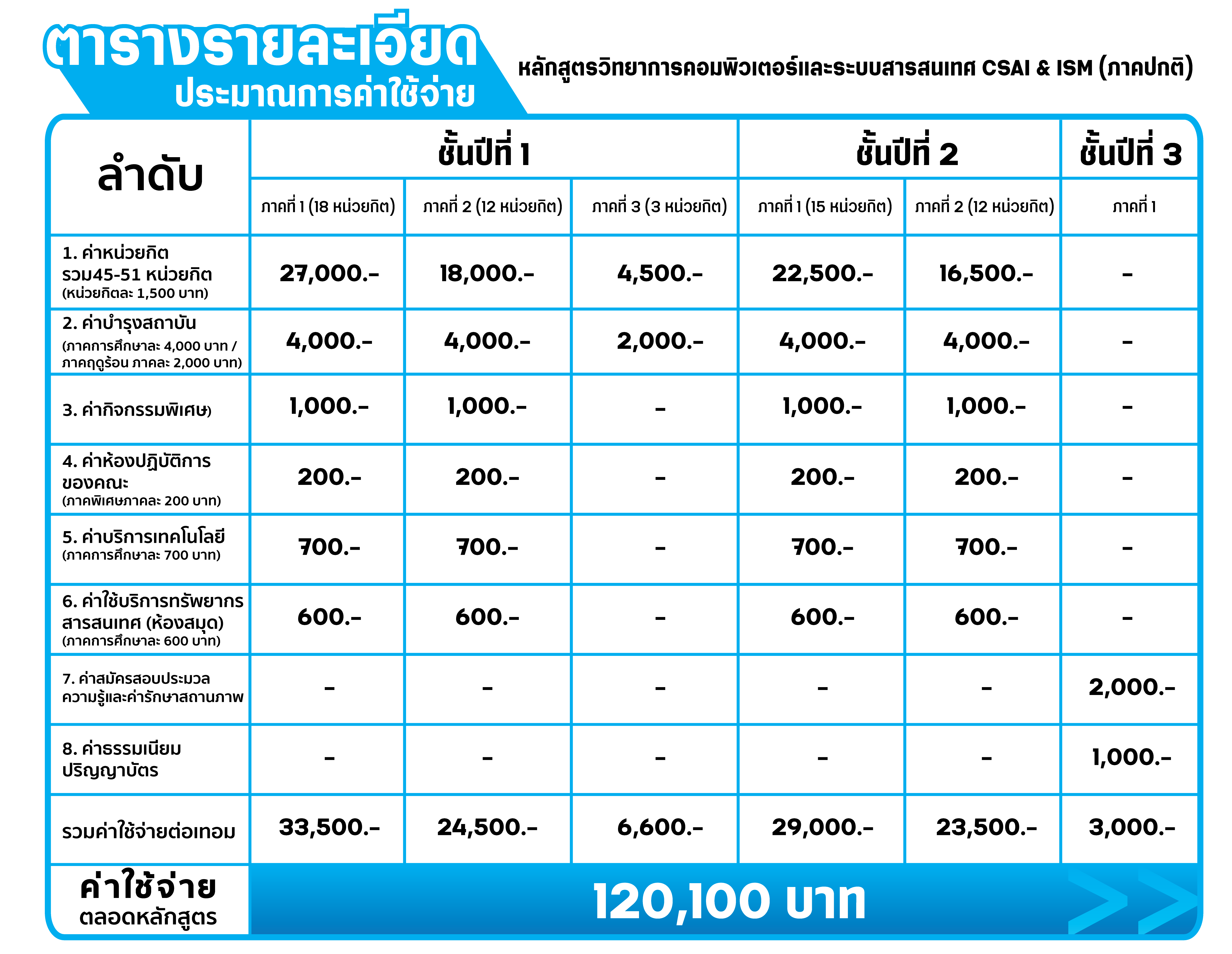Master of Science Program in Computer Science and Information Systems (CSIS)

Master of Science Program in Computer Science and Information Systems
ปรัชญาของหลักสูตร
เปิดโอกาสทางการศึกษาด้วยการไม่จำกัดสาขาที่สำเร็จการศึกษาก่อนเข้าเรียนในหลักสูตร โดยมีการเตรียมความพร้อมเพื่อพัฒนาผู้เรียนให้มีองค์ความรู้ที่ก้าวหน้า ทันสมัย ในด้านวิทยาการคอมพิวเตอร์และระบบสารสนเทศ ทั้งทางทฤษฎีและการปฏิบัติ ที่ตอบสนองความต้องการของตลาดแรงงาน แนวโน้มของเทคโนโลยี และเป้าหมายของยุทธศาสตร์การพัฒนาของประเทศ
วัตถุประสงค์ของหลักสูตร
1) เพื่อให้ผู้สำเร็จการศึกษามีความรู้ทางวิทยาการคอมพิวเตอร์ การใช้เทคโนโลยีสารสนเทศ และการบริหารจัดการระบบและเทคโนโลยีสารสนเทศ ที่ทันสมัย โดยสามารถนำไปประกอบอาชีพและประยุกต์ใช้ในองค์กรทั้งภาครัฐและภาคเอกชน
2) เพื่อให้ผู้สำเร็จการศึกษามีความสามารถรับใช้สังคม และเป็นผู้นำในการประยุกต์ใช้ศาสตร์ที่เกี่ยวข้องได้อย่างเหมาะสม
3) เพื่อส่งเสริมให้มีการค้นคว้าและผลิตผลงานวิชาการทางวิทยาการคอมพิวเตอร์และเทคโนโลยีสารสนเทศ และส่งเสริมให้มีการพัฒนาซอฟต์แวร์ประยุกต์เพื่อใช้ในวงการอุตสาหกรรม
4) เพื่อส่งเสริมให้ผู้สำเร็จการศึกษามีจริยธรรมในการทำงานและสามารถทำงานร่วมกับผู้อื่นได้
1.Computer Science – Artificial Intelligence and Smart Systems ตัวอย่างวิชาหลัก ได้แก่
- Artificial Intelligence
- Machine Learning
- Natural Language Processing
- Computer vision
2.Information Systems Management (ISM) ตัวอย่างวิชาหลัก ได้แก่
- Business Process Design
- Agile Information Systems Development
- Strategic Information Systems Planning
- Information Security Management
ตัวอย่างวิชาเลือก ได้แก่
- Deep Learning
- Generative AI
- Human-Computer Interaction
- Augmented Reality and Virtual Reality
- Blockchain Technology: Smart Contracts and Decentralized Applications
- Big Data Processing and Analytics tools
- Business Process Design
- Web Application Development
- Information Systems Auditing
|
หมวดวิชา |
แผน 1 แบบวิชาการ |
แผน 2 แบบวิชาชีพ |
|
Foundation courses |
3 - 15 credit (Non-credit) |
3 - 15 credit (Non-credit) |
|
Foundation courses |
2 หน่วยกิต |
2 หน่วยกิต |
|
Core courses |
9 credits |
9 credits |
|
Major courses |
12 credits |
12 credits |
|
Elective courses (Minimum) |
3 credits |
12 credits |
|
Seminar |
1 หน่วยกิต |
1 หน่วยกิต |
|
Independent Study |
— |
3 credits |
|
Comprehensive exam |
Exam |
Exam |
|
Oral exam |
— |
Exam |
|
Thesis |
12 หน่วยกิต |
— |
|
(Passed thesis) |
|
|
|
Not less than |
39 หน่วยกิต |
39 หน่วยกิต |
ปัญญาประดิษฐ์และระบบอัจฉริยะ
- Foundation courses mean courses designed to provide knowledge at levels below graduate studies for students to be ready for the master’s degree level including
CI 4001
Mathematics for Computer Science and Information Systems
คส 4002
ความน่าจะเป็นและสถิติสำหรับวิทยาการคอมพิวเตอร์และระบบสารสนเทศ
CI 4002
Probability and Statistics for Computer Science and Information Systems
คส 4003
โครงสร้างข้อมูลและขั้นตอนวิธีพร้อมการเขียนโปรแกรม
CI 4003
Data Structures and Algorithms with Programming
คส 4004
ระบบสารสนเทศเชิงยุทธศาสตร์
CI 4004
Strategic Information Systems
คส 4005
พื้นฐานของคอมพิวเตอร์
CI 4005
Foundation of Computer
คส 4006
พื้นฐานของเครือข่ายคอมพิวเตอร์
CI 4006
Foundation of Computer Networks
คส 4007
ข้อมูลแบบมีโครงสร้างและระบบฐานข้อมูลเบื้องต้น
CI 4007
Structured Data and Introduction to Database Systems
คส 4008
ภาษาอังกฤษสำหรับวิทยาการคอมพิวเตอร์และระบบสารสนเทศ
CI 4008
English for Computer Science and Information Systems
- Foundation courses หมายถึง กลุ่มวิชาที่มุ่งให้นักศึกษามีพื้นฐานสำหรับการศึกษาวิชาหลัก และวิชาเลือก เรียนวิชาในหมวดวิชาพื้นฐาน 1 วิชา (2 หน่วยกิต) ประกอบด้วยวิชาต่อไปนี้
คส 5001
ทักษะการสื่อสารที่มีประสิทธิผลและโน้มน้าว สำหรับวิทยาการคอมพิวเตอร์และระบบสารสนเทศ
CI 5001
Effective and Persuasive Communication Skills for Computer Science and Information Systems
- Core courses These are for students of all majors to enroll courses are as follows
คส 6001
ระบบฐานข้อมูลขั้นสูง
CI 6001
Advanced Database Systems
คส 6002
เครือข่ายคอมพิวเตอร์ขั้นสูง
CI 6002
Advanced Computer Networks
คส 6003
การประมวลผลบนคลาวด์
CI 6003
Cloud Computing
-
Major courses A group of subjects that focuses on providing students with specific knowledge and expertise in studying Plan A.2 and Plan B. Every major studies 4 subjects in the same field according to the major as follows.
-
ปัญญาประดิษฐ์และระบบอัจฉริยะ
คส 7101
ปัญญาประดิษฐ์
CI 7101
Artificial Intelligence
คส 7102
การเรียนรู้ด้วยเครื่องจักร
CI 7102
Machine Learning
คส 7103
การประมวลผลภาษาธรรมชาติ
CI 7103
Natural Language Processing
คส 7104
คอมพิวเตอร์วิทัศน์
CI 7104
Computer vision
-
Major : Information Systems Management
คส 7401
การวิเคราะห์และออกแบบระบบ
CI 7401
System Analysis and Design
คส 7402
การพัฒนาระบบสารสนเทศแบบคล่องตัว
CI 7402
Agile Information Systems Development
คส 7501
การจัดทำแผนยุทธศาสตร์ระบบสารสนเทศ
CI 7501
Strategic Information Systems Planning
คส 7504
การจัดการความมั่นคงของสารสนเทศ
CI 7504
Information Security Management
-
เล่มหลักสูตร CSIS (ปรับปรุง พ.ศ. 2568) – ใหม่
เล่มหลักสูตร CSIS (ปรับปรุง พ.ศ. 2563) – เดิม
| ELOs | Levels of Educational Learning Outcomes in Bloom’s Taxonomy | |
| ELO 1 | ELO1: ความรับผิดชอบต่อสังคม: รู้และรักษากฎ ระเบียบ และมีคุณธรรมจริยธรรมที่เกี่ยวข้องกับคอมพิวเตอร์และระบบสารสนเทศ เพื่อให้การนำไปใช้มีประโยชน์และสร้างผลเสียหายน้อยที่สุดต่อสังคมและสิ่งแวดล้อม | understand |
| ELO 2 | ELO2: ความรู้ล้ำสมัย: มีความรู้ล้ำสมัย ระดับกว้างและลึก สามารถประยุกต์และพัฒนาความรู้ทางคอมพิวเตอร์ การสร้างตัวแบบและขั้นตอนวิธี และระบบสารสนเทศให้ตอบสนองกระบวนการและปัญหาทางธุรกิจและสังคมได้ | understand |
| ELO 3 | ELO3: การแก้ปัญหาที่มุ่งเน้น: สามารถเข้าใจ ระบุ และวิเคราะห์ปัญหาที่เกิดขึ้นทางธุรกิจและสังคมที่เกี่ยวข้องกับคอมพิวเตอร์และสารสนเทศ และนำองค์ความรู้ทางคอมพิวเตอร์และระบบสารสนเทศที่มีมาจัดการแก้ไขปัญหาที่เกิดขึ้นจริงได้อย่างมีประสิทธิภาพและประสิทธิผล สามารถสื่อสารและทำงานร่วมกับผู้อื่น | apply |
| ELO 4 | ELO4: นวัตกรรมเทคโนโลยี: พัฒนาและออกแบบระบบหรือองค์ความรู้ทางคอมพิวเตอร์และระบบสารสนเทศให้ทันต่อการเปลี่ยนแปลงของเทคโนโลยีและสภาพแวดล้อมทางธุรกิจและสังคม | analyze and evaluate |



